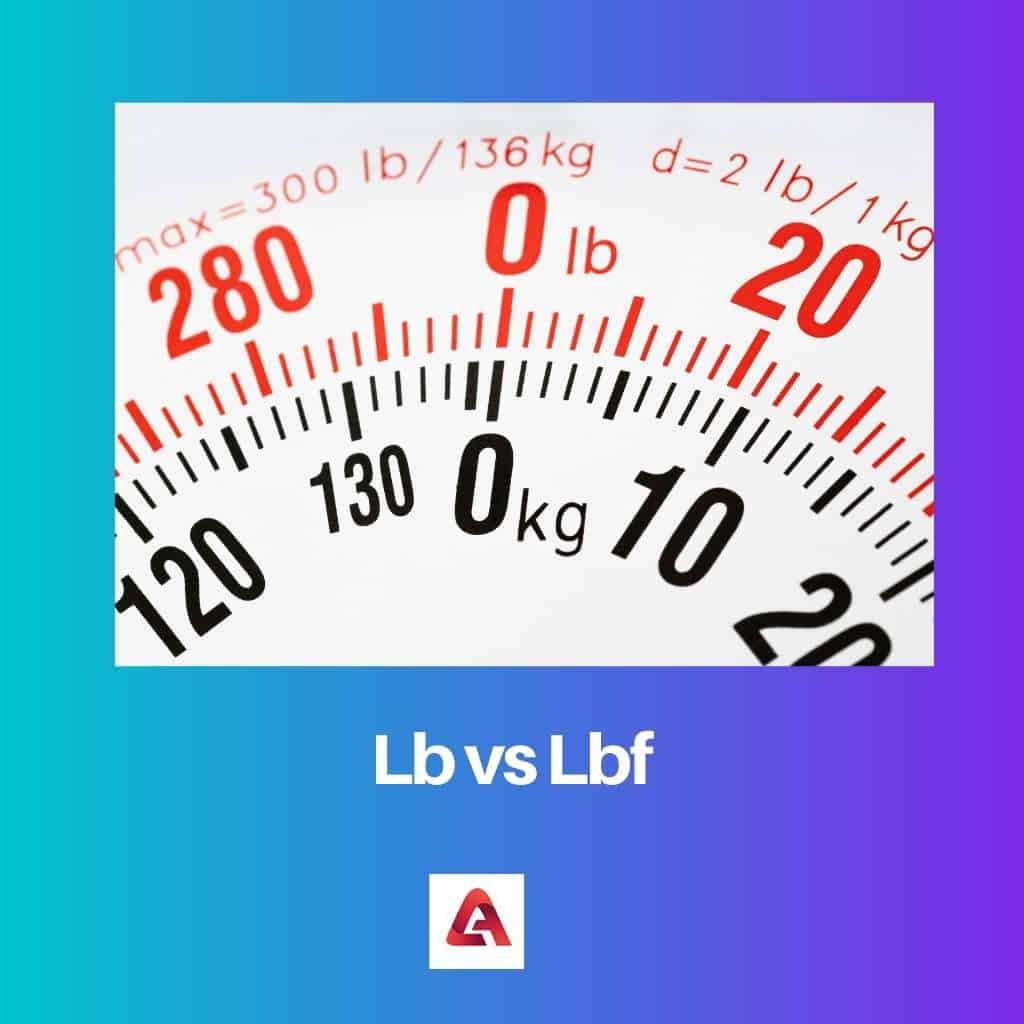The physics terms, which are the basic key for the most significant inventions made till now, have sometimes tended to be confusing little bit.
Such terms need to be explained carefully with the applications so that learner does not tend to confuse about the complexity of such terms. The terms discussed here are pound (lb) and pound-force (lbf).
Key Takeaways
- LB measures mass, while LBF measures force.
- LB is an abbreviation for pound, and LBF stands for pound-force.
- The conversion factor between LB and LBF depends on the local acceleration due to gravity.
Lb vs Lbf
Lb is a unit of measurement for a weight that is mostly used in the United States. It means ‘pound’ and can be used to measure the weight of any object. Lbf is a term that is used to measure the gravitation force exerted on the surface of the planet we are living on, that is, Earth, by an object.

Lb is also known as pound. It is basically a unit of measurement for weight. The Lb is a measurement unit used for measuring weight and is recognized by the United States for its regular use.
It includes measuring the weight of any object and is commonly used for all measurements.
Lbf is also known as pound-force. It is used to measure the force.
Lbf is pound-force which is the force exerted by any object on the surface of the only planet life is possible, i.e., the earth under the influence of gravitation.
Comparison Table
| Parameters of Comparison | Lb | Lbf |
|---|---|---|
| Concept | Lb is also known as pound. It is basically a unit of measurement for weight. | lbf is also known as pound-force. It is used to measure the force. |
| Definition | Lb is a unit of measurement for weight recognized by the United States. | lbf is pound-force which is the force exerted by anything on the earth’s surface under the influence of gravitation. |
| Conversion | If the 1 lb or a pound is converted into another well-known unit of measurement i.e., kg. It will be 0.45359237 kg. | If the 1 lbf or a pound-force is converted into another well-known unit of measurement i.e., newton. It will be 4.448 N. |
| Comparison | The lb is used to measure the mass of an object. | If the lbf has to be found, then the mass, which is lb, has to be multiplied by the gravitational force. |
| Implication | Lb represents the actual mass of an object. | Lbf represents the force exerted by the same object on the surface of the earth. |
What is Lb?
Lb is also known as pound. It is basically a unit of measurement for weight. The Lb is a measurement unit used for measuring weight and is recognized by the United States for its regular use.
It includes measuring the weight of any object and is commonly used for all measurements. Lb is a unit of measurement for weight recognized by the United States.
If the 1 lb or a pound is converted into another well-known unit of measurement, i.e., kg. It will be 0.45359237 kg.
The lb is used to measure the mass of an object. Lb represents the actual mass of an object.
The mass of an object, also known as weight, remains the same no matter what influence is acting on them, like any force or field.
The forces acting on that substance may change the effect on other surfaces or objects. The term lb is a derivation of “ libra pondo.”
It is a phrase that belongs to Latin and means “a pound weight.” Every location uses different measurement units according to their habits which have been used for a long time.

What is Lbf?
Lbf is also known as pound-force. It is applied to do the measurement of the force.
Lbf is pound-force which is the force exerted by any object on the surface of the only planet life is possible, i.e., the earth, under the influence of gravitation.
Lbf is pound-force which is the force exerted by anything on the surface of the earth under the influence of gravitation.
If the 1 Lbf or a pound-force is converted into another well-known unit of measurement, i.e., newton. It will be 4.448 N.
If the Lbf has to be found, then the mass, which is lb, has to be multiplied by the gravitational force. Lbf represents the force exerted by the same object on the surface of the earth.
The Lbf can be changed under many other circumstances according to the influence. Just like that, Lbf can be changed between Earth’s surface and space.
The derivation of the pound can be found and is dependent on the object’s mass, and the forces acted on it by the planet’s gravity. The gravitational field can be changed. Thus the pound-force can be changed.
Main Differences Between Lb and Lbf
- The main difference between the Lb and Lbf is totally based and defined on their meaning and their application of theirs, respectively. The Lb is a measurement unit used for measuring weight and recognized by the United States for their regular use, whereas Lbf is a defined term used to measure the gravitation force exerted by an object on the surface of the planet we are living on, i.e., Earth.
- Lb is a unit of measurement for weight recognized by the United States, whereas Lbf is pound-force which is the force exerted by anything on the surface of the earth under the influence of gravitation.
- If the 1 lb or a pound is converted into another well-known unit of measurement, i.e., kg. It will be 0.45359237 kg, whereas If the 1 Lbf or a pound-force is converted into another well-known unit of measurement, i.e., newton. It will be 4.448 N.
- The lb is used to measure the mass of an object, whereas If the lbf has to be found, then the mass, which is lb, has to be multiplied by the gravitational force.
- Lb represents the actual mass of an object, whereas Lbf represents the force exerted by the same object on the surface of the earth.
- https://www.sciencedirect.com/science/article/pii/S0093691X17301000
- https://arc.aiaa.org/doi/pdf/10.2514/1.B34037

The comparison table was really helpful, now I can differentiate between the two easily
I appreciate the effort, however, I think the explanation could have been clearer
Actually, I found the explanation to be very thorough
I felt like this article was a bit too detailed, could have been simplified
I actually liked the amount of detail in this, to each their own!
Agreed, there’s such a thing as too much information
Very informative and educational, thank you for clearing that up!
Couldn’t agree more, this was an excellent breakdown
I thought the differences were clear, but now I understand it better, great read
I expected more in-depth information about the importance of these terms
Really brilliant comparison, the implications were especially interesting
I found the implications to be a bit unnecessary and over-the-top
I couldn’t agree more, the implications were eye-opening
This left me feeling more confused than before, too complex for my taste